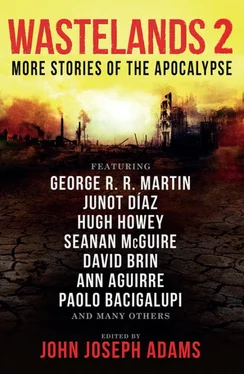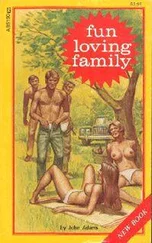Behind me, she says, “I voted yes, you know.”
Her voice is far away, and it pushes me deeper into the ground. I turn—I try to turn, but I’m thigh-deep in mud, and I realize her voice is far away because she hasn’t followed me. She’s been paying attention to the lay of the land.
“Get me out of here,” I say.
She says, “I voted yes. It was a two-two split until I voted. I thought it would be worth it to suffer for a while, until everything could be set right. We thought it would be worth it, to start over.”
The mud is slimy against my stomach.
“I was willing to die,” she said. “Then I made it out, and I was willing to help anyone I found. I helped you.”
I realize she’s speaking in past tense; that she’s done helping me.
I try to step back out of the sinkhole, but the mud is slick and heavy, and it pulls me off-balance, and I sink deeper. I take a breath, trying to calm down. You can’t fight sinkholes, you have to spread your arms or something to slow yourself down; I remember this from a movie, I can get out of here.
“Point Zero was right,” she says, and her voice is angled toward the sky. “The threat would have been better. We gave too much credit to people.”
I choke out, “Fuck, I’m sorry,” in a tone that cuts the roof of my mouth.
It falls quiet. The inky dark has made my other senses sharper; I can hear the mud sucking at my clothes, my pulse pounding in my ears. Far off, I hear an owl.
“I’m sorry, too,” she says, and I hear leaves crunching under her feet as she steps back.
I scream, I kick wildly, I dig into the mud to try to swim out, but it’s too slick and I’m in too deep and the oily blackness swallows me; when I scream, I choke on it.
“The new world has to be better than the old one,” she says. “That’s my project now.”
I can hardly hear her. The darkness has slid into my nose and my ears, leaking past my squeezed-shut eyes, and I know the next time I open my mouth I’ll swallow clay and it will be over.
“Next time,” she says, not unkindly, “I’ll know better what kind of person to look for,” and there are two footsteps before the mud closes over me.
(Strange what you’re good for, when circumstances change.)
DREAMS IN DUST
D. THOMAS MINTON
The arrival of the dust-covered girl caught Keraf by surprise. The girl’s slender face, sun-beaten to a deep brown, blended seamlessly into the cloth wrapped around her head. She couldn’t have been more than seventeen, but she wielded her rifle with ease.
Keraf didn’t even try for his own rifle, slung over his shoulder. Shooting her would be a waste of his last bullet because she didn’t appear to have a canteen.
“My sand sled got demasted four days ago,” he said in response to her unspoken question. His tongue, dry and dusty, made it difficult to speak. “I have things I can trade for water.”
Her eyes roved over Keraf’s gauzy robes, his keffiyeh wrapped around the lower half of his face, his rifle, the narrow metal cylinder at his waist, and the empty water bag slung over his back.
“I could just shoot you,” she said.
With roles reversed, Keraf might have said the same. In the wastes of the Atlantic Basin, bandits outnumbered honest men. He didn’t think she would believe him, but told her what he thought was the truth. “I’m carrying something that could save the Earth.”
“Nothing can save the Earth,” the girl said.
“Water can.”
Keraf thought he saw the tip of her rifle dip, but the sun was strong and the shadows stark.
The girl’s eyes narrowed. “Start walking, and don’t try anything. I’ve deaded better liars than you.”
* * *
The girl led him across the dunes to an earthen embankment. Keraf hadn’t realized it was there until he was upon it; the mound of earth blended with the beige and umber monotony of the rippled dunescape. They were met by a boy covered more in sand than clothing. After a whispered exchange with the girl, the boy set off running up and over the hill.
Keraf waited with the girl, collecting a thicker skin of dust.
After a few minutes, the boy returned with a bundle of cloth-wrapped poles slung over his shoulder. A stoneware bottle bounced from a cord against his left thigh. He gave the girl the bottle, then set about erecting a canopy from the poles.
The girl’s lips glistened when she lowered the bottle.
Keraf watched the water evaporate. He licked cracked lips with a sandpaper tongue. Six swallows, he had counted, more than a day’s ration in the lamasery.
He unslung his water bag and dropped it in the sand at the edge of the canopy. It wasn’t any cooler in the shade, but at least he was out of the sun.
The girl eyed him, but said nothing. She shared the same fine bones and gold-flecked eyes as the boy. A family compound, then, Keraf thought, hidden somewhere over the embankment. They couldn’t have had more than a condenser or two, but maybe a trade was still possible.
After a few minutes, an older man and woman came over the embankment and down the sand face. The woman carried a naked toddler on her hip. When the girl saw them, she ran to meet them and exchanged her rifle for the little boy.
As they came into the shade, Keraf pushed his shoulders back and rose up to his full height. The man peeled his checkered keffiyeh aside to reveal cheeks covered with coarse gray stubble and skin pitted from where the cancers had been cut away.
In his hands he carried another stoneware bottle capped with a small metal cup. He wiped the dust from the inside of the cup with the sleeve of his robe and poured a finger of water. He extended it to Keraf.
Keraf pressed his palms together and touched his fingertips to his forehead. “Your water is life,” he murmured. When he reached for the cup, the old man pulled it back.
“Your face,” he said. “I want to see who drinks our water.”
Keraf unclipped his keffiyeh, exposing his face. Even though the air was hot, it felt cool on his black skin.
“The mark of the Mechanists,” the man said, nodding at the metal ankh hanging at Keraf’s throat. “We don’t see many of your kind here.” He extended the cup a second time. “I am called Faruk,” he said. “You have met Imani, my grandniece.” He motioned to the girl with the toddler in her arms.
The child’s top lip was split from his mouth to his nose, a defect of birth. Keraf had seen such deformities in small enclaves before. It gave him hope that the one thing he could trade had value.
Keraf stared down into the water, and forced himself to sip. It cooled his burning tongue. He licked every drop of moisture from his lips before tipping the last of the water into his mouth. He handed the cup back to Faruk.
“I am Keraf,” he said, now that his throat was lubricated. “Your water is life; I owe you my life.”
Faruk handed the cup to the little boy in Imani’s arms. The boy’s slender red tongue snapped in and out through the cleft in his lip, licking dry the beads of water that clung to the metal.
Keraf found it difficult not to stare. “I am on a mission to Costa de Santo,” he said, pulling his eyes from the toddler. “Four days ago, my sled capsized crossing the mid-Atlantic mountains. What water I had was lost. I seek water so I can complete my mission.”
Faruk’s eyes narrowed. “We have no water to spare.”
Keraf did not expect anyone to give him water. A single condenser could produce a gallon a day from the basin’s arid atmosphere, enough for only a handful of people and a few plants.
“I can trade,” he said. “I carry a fully-functional uric acid modification, enhanced melanin, and high-efficiency sweat glands.” The genetic modifications had become fixed in the Earth’s human population prior to the final dewatering by the Orbitals, but small enclaves could regress through inbreeding. “My semen is worth a few days of water.”
Читать дальше












